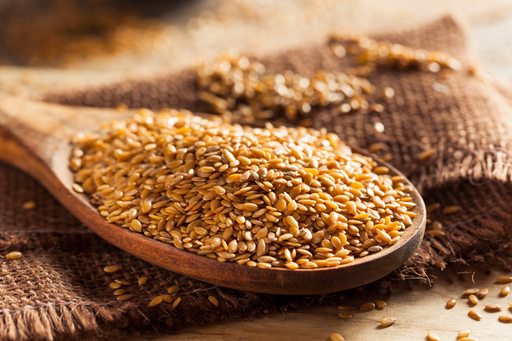
How Does Flaxseed Affect Hormonal Health?
Chia seeds, hemp seeds, and sunflower seeds are popular snacks on a ketogenic diet because they’re high in healthy fats and ultra-low in both total and net carbs. But what about flaxseeds?
Though not as easily snackable as its brethren, these tiny powerhouses pack an impressive punch for your hormonal health. So let’s explore the scientific effects of flaxseeds to discover why they deserve a prime spot in your diet.
What is Flaxseed Anyway?
Flaxseed or linseed (Linum usitatissimum) comes from the flax plant and is grown in Canada, China, the US, and India.[*] The ancient Egyptians used flaxseed as both food and medicine.[*] But they probably had no idea it’s loaded with vitamins, minerals, and nutrients that ensure your body operates at peak efficiency.
The health benefits of flaxseed are primarily thanks to:
Essential Omega-3 Fatty Acids
Flaxseed and flaxseed oil are rich in alpha-linolenic acid (ALA), a plant-based omega-3 fatty acid that may help prevent or treat cardiovascular disease, arthritis, poor cholesterol levels, high blood pressure, metabolic syndrome, cognitive impairment, and more.[*][*]
Omega-3s are also anti-inflammatory, so they can help reduce inflammation and minimize delayed-onset muscle soreness (DOMS) for faster recovery.[*]
Super Low-Carb Fiber
Nothing slows down a workout or activity like a sluggish gut. Despite its small size, flaxseed is a rich source of low-carb fiber for improved gut health.[*] One tablespoon of whole flaxseeds clocks 2.97 grams of total carbs and 2.81 grams of fiber. That’s 0.16 grams of net carbs — a practically zero net-carb keto superfood.[*]
Because flaxseed contains both soluble and insoluble fiber, it helps you feel satiated quickly and fuller longer. It also adds bulk to your stool to help things move quickly through your system.[*] You’ll be able to stay regular, avoid constipation, and resist hanger-induced carb cravings with ease (and without any uncomfortable side effects of laxatives or fiber supplements).
Lignans
Flaxseed is one of the richest sources of dietary lignans, boasting levels that are 800x higher than most other foods.[*] Lignans are a form of polyphenols (compounds with antioxidant properties) and a type of phytoestrogen, which are nutrients that behave similarly to the female hormone estrogen.[*]
With that introduction, let’s talk hormones.
The Benefits of Flaxseed for Estrogen Balance
Lignans contain the highest concentration of phytoestrogens. Once digested by intestinal bacteria, phytoestrogens become bioactive forms that can bind to or block your estrogen receptors.[*] This is why studies show that flaxseeds can:
Balance Estrogen Levels To Prevent Estrogen Dominance
Estrogen is a hormone that regulates your reproductive system. It rises and falls in sync with other hormones, such as progesterone. However, when estrogen levels get too high, they can create a hormonal imbalance that increases your risk of certain medical conditions and causes unpleasant symptoms like:[*]
- Irregular cycles
- Increased PMS symptoms
- Mood changes
- Difficulties concentrating
- Bloating and water retention
- Lower sex drive
- Weight gain
- Insomnia
- Fibroids and endometriosis
- Thyroid abnormalities
- Hot flashes
- Breast tenderness
Now for the good news: Flaxseed lignans and phytoestrogens can act as adaptogens, meaning they can both enhance estrogen activity (estrogenic) or block it (anti-estrogenic effects) as needed. Low levels of estrogen? Flaxseed can offer a gentle nudge upward. Too high? Flaxseed can spur estrogen metabolism.[*]
See, when your body doesn’t break down enough estrogen, it can hang around and accumulate, leading to symptoms and biomarkers of estrogen dominance. Flaxseeds bind to estrogens in the digestive tract, spur excretion to eliminate them, and help restore hormonal balance.[*]
Offer Menstrual Cycle Support
Are you seed cycling? Advocates say consuming specific seeds at different times during your menstrual cycle can support optimal hormone balance, encourage more cycle regularity, and reduce PMS symptoms.[*]
Studies on seed cycling show that consuming flax seeds leads to “significantly higher” ratios of progesterone/estradiol, improves hormonal disturbances, and promotes a healthy life.[*][*] Researchers learned flaxseeds are even effective for reducing PMS.[*]
Improve PCOS Symptoms
Polycystic ovary syndrome (PCOS) is the most common endocrine disorder in women during their childbearing years.[*] It’s associated with high levels of androgens (male sex hormones like testosterone), ovarian cysts, and other side effects.
In randomized clinical trials, flaxseed supplementation (either alone or via seed cycling) has shown a positive effect on lowering androgens, helped reduce body weight, improved lipid profiles, and may significantly reduce ovarian cysts.[*][*][*]
Relieve Menopausal Symptoms
Menopause is associated with a decline in estrogen. But flaxseed phytoestrogens can mimic the effects of estrogen in the body to prevent or ease menopausal symptoms.
In a study of 140 menopausal women, flaxseed consumption decreased menopause symptoms and increased quality of life.[*] A meta-analysis of nearly 40 studies even revealed that flaxseeds had a positive effect on reducing the frequency and severity of hot flashes among postmenopausal women better than a placebo.[*]
Reduce the Risk of Cancer
Estrogenic cancers include ER+ (estrogen receptor positive) breast, ovarian, uterine, lung, and thyroid cancer. Researchers say flaxseed lignans and phytoestrogens can attach to estrogen receptors to block the growth of these cancer cells.[*]
According to studies, a higher intake of dietary flaxseed offers significant protection against breast cancer and lessens the risks of other types of cancer.[*][*] Further, observational studies and a systematic review of 10 trials reveal that:
- Dietary flax may lower levels of sex steroid hormones implicated in the development of breast cancer, especially in overweight/obese women.[*]
- Eating flaxseeds is associated with a 20% reduction in breast cancer risk.[*]
- Two specific dietary phytoestrogens found in lignans, enterolactone and enterodiol, may suppress breast tumor growth and spread.[*]
This research highlights the effects of dietary flaxseed on women’s health, but...
What About Flax and Testosterone?
One of the biggest health and wellness myths is that flaxseeds lower testosterone in men. But this seems to stem from a fear of the word phytoestrogen more than legit science.
While researchers in a handful of old animal studies noticed a slight drop in testosterone when supplementing with large quantities of flaxseed, the average dude won’t ever consume that much to worry.
On the other hand, flaxseeds are bursting with those healthy omega-3 fats, fiber, and antioxidants. They can help decrease blood pressure, cholesterol, and blood sugar to prevent cardiovascular disease, type 2 diabetes, and weight gain in men.[*][*] They may even lower the risk of prostate cancer and halt prostate tumor growth.[*][*]
All those reasons prove it’s time to add flaxseeds to your keto diet.
Sneak In Flaxseeds the Easy Way With Keto Brick
Unlike chia, hemp, pumpkin, or sunflower seeds, your body has a difficult time digesting whole flaxseeds, so they have to be ground for max bioavailability. Then you can add a tablespoon to your smoothies, salads, and other keto foods to soak up all these benefits.
Then there’s Keto Brick — the performance bar built by performers for performers.
Our shelf-stable, high-quality bars make macro-tracking and meal prep super easy. Produced in-house with zero compromises. Our Mocha Cream and Peanut Butter flavors contain organic golden flax. Each tasty Keto Brick contains:
You won’t find any crap in our bars — no gluten, soy, corn fiber, allulose, chicory root fiber, or fillers that detract from your unwavering commitment to your health. We got you.
Never Underestimate The Underdog
In the world of keto nutrition, it’s easy to overlook the small but mighty contenders. Flaxseeds may be tiny, but their impact on your health is colossal. And it only takes a tablespoon or two to elevate your diet to legendary status.
Your body deserves the best, so let those flaxseeds propel you to short- and long-term victories.
💪 Fuel smart, train hard, and stay fit with Keto Brick. With nine outstanding whey and vegan protein flavors, every bar is a new adventure.
Leave a comment
Comments will be approved before showing up.
